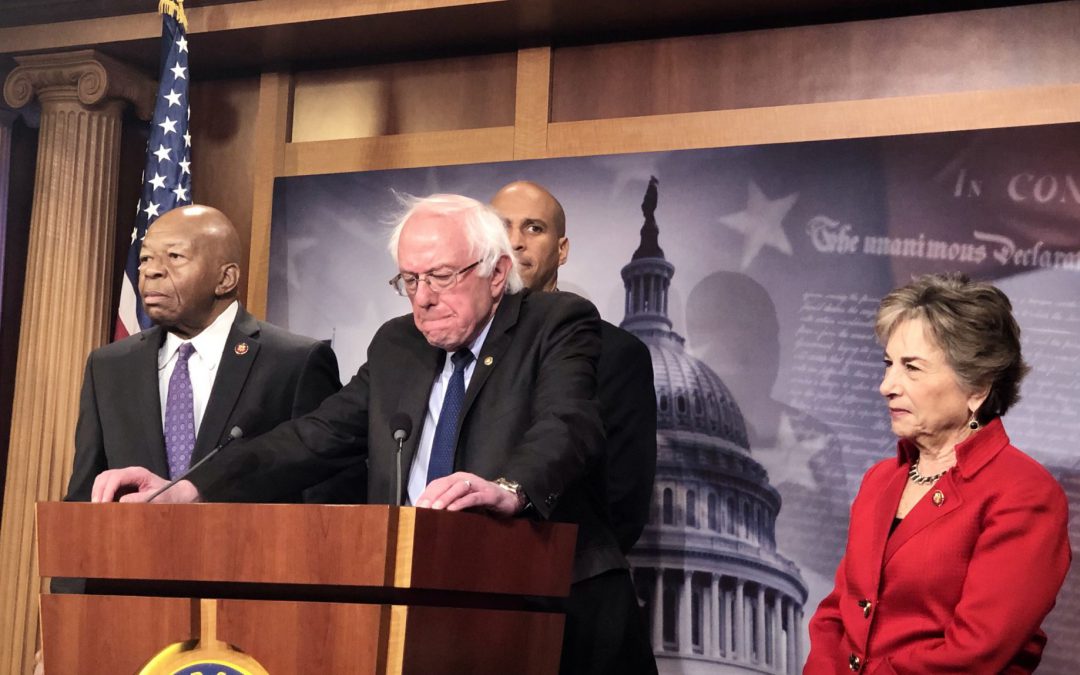WASHINGTON — Sen. Bernie Sanders and several Democratic House members proposed legislation Thursday to cut prescription drug prices, saying U.S. prices are higher than in most other developed countries.
“How many Americans have to die before Congress takes on the pharmaceutical industry?,” Sanders, I-Vt., said.
Rep. Jan Schakowsky, D-Ill., said the Democratic majority in the House should send a message to pharmaceutical companies that Democrats will act to decrease prescription drug prices.
They proposed three measures:
— A bill to peg the price of prescription drugs sold in the U.S. to the median price in Canada, the U.K., France, Germany and Japan;
— A measure that would give the secretary of Health and Human Services the ability “to negotiate lower prices for prescription drugs under Medicare Part D;”
— A bill to allow the importation of lower-cost medicine from countries like Canada.
Sanders focused on combating the increasing cost of prescription drugs during his 2016 presidential primary campaign. Reducing prescription drug prices is also one of the Democrats’ priorities after taking back control of the House.
In an interview, Schakowsky said she also is addressing drug prices in other legislation, including a bipartisan bill that would require companies to disclose their drug manufacturing prices. She said making those figures more transparent would galvanize the public to demand lower retail prices.
“There’s a reason that they don’t want to disclose this information because they know that it’s so combustible,” she said of pharmaceutical companies.
Schakowsky said her Republican colleagues “may be very willing” to support the new proposal or to work on similar legislation because of what Sanders described as “overwhelming” public support for lowering prescription drug prices.
Sen. Cory Booker, D-N.J., referred to the proposal as “common sense” and to the U.S. as “an outlier in developed nations” because of its high prescription drug costs.
He also noted that he was one of only six senators who have stopped accepting corporate campaign donations. During his first four years in office, Booker received $226,000 from pharmaceutical companies; House Majority Leader Steny Hoyer in November became the fourth member of Congress to have accepted over 1 million dollars in pharmaceutical company campaign contributions, according to Kaiser Health News.
Two of the three bills — the Medicare drug price negotiation proposal and the drug importation measure — were introduced in the Senate in 2017 but did not pass. They faced strong opposition by the pharmaceutical industry and were not supported by Republicans.
In a 2018 written response to a Health and Human Services request for information regarding lower drug prices, the Pharmaceutical Research and Manufacturers of America wrote that while it “recognize[d] the importance of lowering the amount that patients are charged,” any “wrong changes” to programs like Medicare and Medicaid would hurt program beneficiaries.
President Donald Trump has expressed frustration with high prescription drug prices and in May introduced his “American Patients First” plan that outlined steps the administration could take, such as regulating rebates and making it easier for generic manufacturers to create similar products, increasing competition.
…But Democratic leaders said it did not go far enough.
Sanders said that Trump should support the new proposals “if he is serious about lowering prescription drug costs in this country.”

